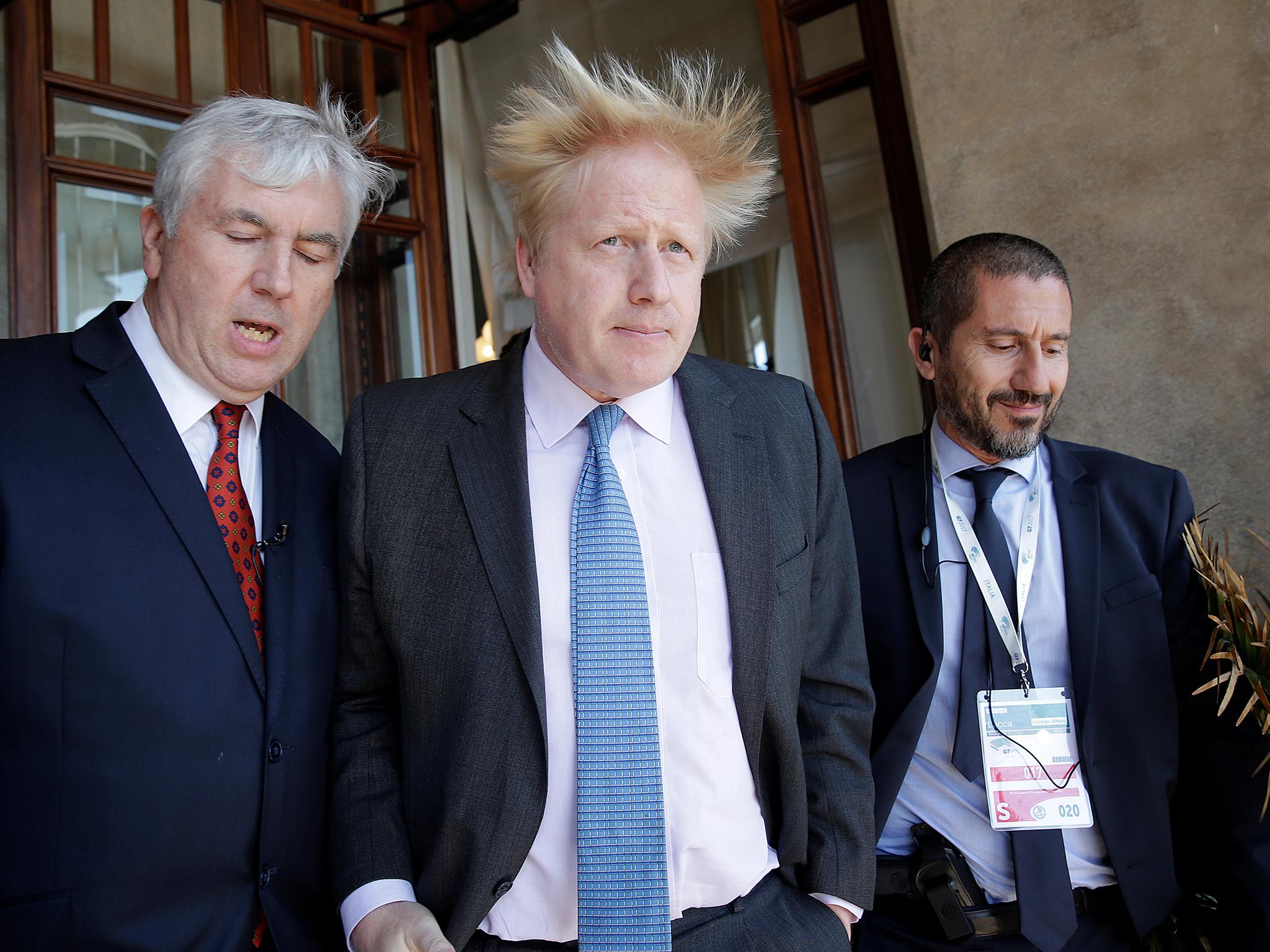Boris Johnson tried his charm offensive on foreign government ministers. This is why it went down so badly
What sounds funny to British audiences or in newspaper columns hasn't translated well with diplomats. 'We are pro-secco, and by no means anti-pasti' didn't impress Europeans; nor did his invented words and Latin quips, such as 'gloomadon-poppers' and 'whingerama'

Boris Johnson has now been Foreign Secretary for nine months. He has travelled a great deal, and made a large number of speeches in his typically eccentric style, but failed either to establish himself as a serious player in global diplomacy or to set out any coherent vision for UK foreign policy post-Brexit.
The Government’s often-repeated mantra that “We are leaving the EU, but we are not leaving Europe” cries out for further explanation, and the idea of “Global Britain” still remains an empty phrase, but Boris continues to pepper his speeches with jokes and riddles. The G7 foreign ministers’ meeting this week has confirmed his low reputation among other key foreign ministers. Is it now too late for him to transform his reputation as an amicable but unserious figure into an effective British foreign secretary?
Theresa May arrived in No.10 with far less experience of foreign than domestic policy – like many of her predecessors. Margaret Thatcher relied on Lord Carrington for advice and support, as she learned the complexities of multilateral diplomacy and came to terms with the personalities and domestic constraints of their leaders; Tony Blair relied on Robin Cook. May chose Boris for internal party reasons after a bruising referendum campaign. It was a post he wanted, and they are reported to get on well. He keeps the right-wing media in London happy – but it’s hard to believe that he provides the Prime Minister with valuable advice.
Last December, he gave a speech at Chatham House, which he claimed would be “the first in a series of speeches setting out our foreign policy strategy”. He then devoted as much of the speech to the future of the world’s elephant population as to the future of Britain’s relations with France, Germany, or Russia.
As in many other speeches before and since, he revelled in the success of the Harry Potter books as showing the global reach of Britain’s “soft power”. And he rolled out the deliberately obscure phrase (borrowed from Churchill’s description of his relationship with the Church of England) that our future relationship with the European continent would be similar to that between a flying buttress and a cathedral, “supportive of the EU project, but outside the main body of the church”.
He has confused many foreign audiences with this phrase, using it even to Muslim audiences. At one European foreign ministers’ meeting, Boris has happily remarked, the simultaneous interpreter rendered it as a “flying bucket”. That is the point of it: it is intended to sound clever and profound, but to remain entirely unclear.
What sounds funny to British audiences too often unnecessarily irritates foreign governments. “We are pro-secco, and by no means anti-pasti,” he told a British Chambers of Commerce conference in February – thus reminding the Italian government yet again of his promise that they are so desperate to sell us sparkling wine that they will be willing to give the UK the Brexit package we want. Latin quips and invented words – “gloomadon-poppers”, “whingerama” – added sparkle to his newspaper columns, but don’t impress diplomats.
Theresa May has understood that good relations with the German government will be key to successful post-Brexit diplomacy. But Boris’s repeated references to the Second World War hinder her efforts, and provoke negative comments in the German media. Politicians and journalists there have not forgotten his comparisons of the EU with Hitler’s conquered Europe; his post-referendum joke about EU governments wanting to administer “punishment beatings” to Britain went down badly also with the French.
Boris Johnson must have understood that he was actively disliked by many foreign policy-makers across Europe before he became foreign secretary, for the fake stories he reported about Brussels regulation when he was the Telegraph’s Brussels correspondent. The tragedy is that he has done nothing to rebuild his reputation since he took office.
One nostalgic reference point on which he is however explicit is his assertion that “Britain is back East of Suez…projecting British power worldwide, including through the Malacca Straits” – reversing a decision taken, on sound strategic grounds, 50 years ago. He’s given no explanation as to why we should defend Singapore, or denude the North Atlantic of ships to assemble a carrier task force for the South China Sea.
There’s a “back to the 1950s” tone to much of his apparent world view, evident also in his support for a new royal yacht. One of his colleagues voiced the underlying assumption that our closest friends are still in “the white Commonwealth” – provoking a formal protest from the Canadian minister to whom it was addressed.
Nevertheless, Boris remains popular with the Conservative grassroots. It will take time for his incompetence, now evident to both friendly and unfriendly foreign governments, to become clear to the domestic audience.
Liberal Democrat leader Tim Farron’s description of him as “Trump’s poodle” struck home; the similar hairstyle, the greater ease he displays in following an American lead than in cooperating with France or Germany, make our New York-born foreign secretary vulnerable to charges that “Global Britain” in his hands will shadow Washington wherever President Trump takes us.
Unlike the Liberal Democrats, he simply doesn’t realise that you can’t have a hard Brexit and a strong, influential Britain. The UK needs the goodwill and understanding of our continental neighbours as we negotiate the complexities of our post-Brexit relationship. The current foreign secretary will hinder, not help, the success of these negotiations.
William Wallace is a Liberal Democrat peer in the House of Lords

Join our commenting forum
Join thought-provoking conversations, follow other Independent readers and see their replies